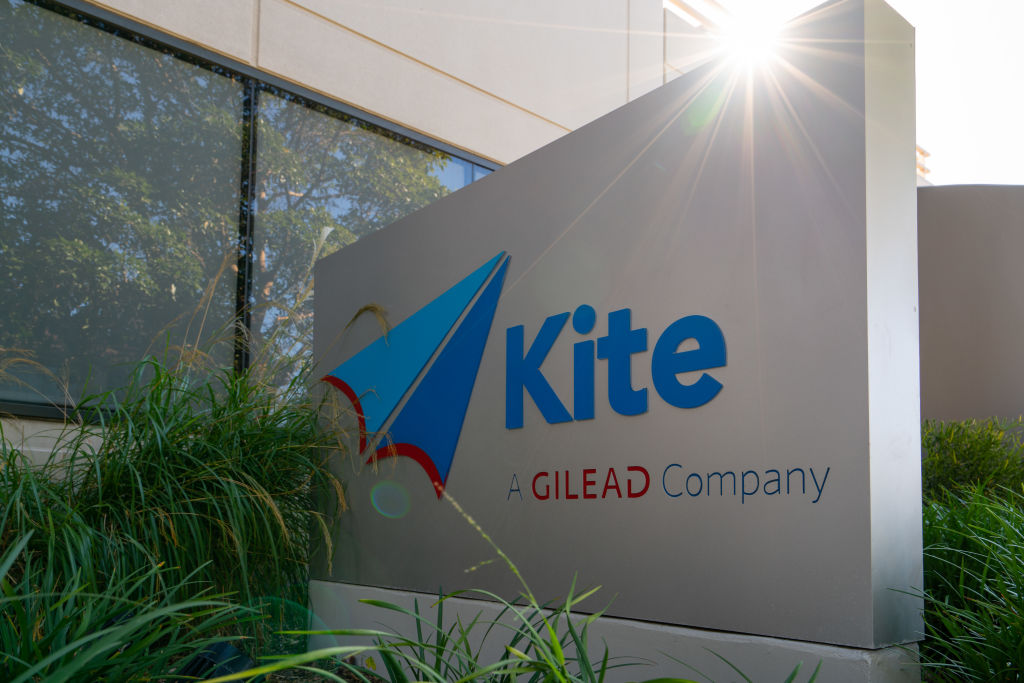
Gilead Sciences broke into the field of cancer cell therapies through an acquisition. Now it’s aiming to be part of the next generation of such therapies by buying clinical-stage Interius BioTherapeutics, a deal that also gives the company the opportunity to develop this highly personalized type of therapy for autoimmune diseases.
Kite, the Santa Monica, California-based cell therapy subsidiary of Gilead, has entered a definitive agreement to pay $350 million cash to acquire startup Interius, the companies announced Thursday. The deal brings to Kite a cancer program in early clinical development as well as the platform technology that spawned it.
The first generation of cell therapies are cancer treatments made by harvesting a patient’s T cells, engineering and expanding them in a lab, then infusing them back into the patient. Kite has two FDA-approved CAR-T therapies for certain blood cancers, Yescarta and Tecartus. In 2017, Gilead paid $12 billion to acquire Kite.
The multi-step process of making ex vivo cell therapies is expensive and can take a month or more. In that time, a patient’s disease can advance. Before patients receive these cell therapies, they must undergo a preconditioning regimen that comes with complication risks. Kite has a large network of authorized treatment centers that efficiently produce its cell therapies. In a media briefing during the annual J.P. Morgan Healthcare Conference in January, Kite Executive Vice President Cindy Perettie boasted the company has the industry’s fastest turnaround time at 14 days for Yescarta. But an in vivo therapy offers the potential to bring treatment to patients even faster.
“In vivo therapy is a promising frontier with the potential to transform how we approach treating patients, shifting to more accessible and scalable solutions,” Perettie said in the acquisition announcement.
Philadelphia-based Interius is part of a group of young biotechs aiming to overcome the limitations of ex vivo cell therapy by manufacturing the therapeutic chimeric antigen receptor (CAR) cells in vivo — inside a patient’s own body. This approach avoids the manufacturing infrastructure associated with CAR-T therapies, shortens the timeline for a patient to receive the therapy, and eliminates the need for a preconditioning regimen.
Interius’s platform technology uses a lentiviral vector to target specific cells in the body, delivering to them genetic payloads that program the target cells to produce CAR cells. Lead therapeutic candidate INT2104 uses a single viral vector to target T cells and Natural Killer (NK) cells to yield CAR-T and CAR-NK cells programed to go after disease-driving B cells. Last fall, Interius began a Phase 1 test evaluating INT2104 as a potential treatment for blood cancers driven by malignant B cells. Preclinical data for this program was published in June in the journal Molecular Therapy.
The Interius pipeline also includes INT2106, which the biotech is developing as a way to reset the immune system to potentially treat a range of autoimmune diseases stemming from the production of autoantibodies. This preclinical therapeutic candidate leads to the in vivo production of CAR T and CAR NK cells to target disease-driving B cells that express the protein CD19. The targets and potential indications for a third program, the discovery-stage INT2108, remain undisclosed.
Gilead’s Interius acquisition follows other big pharma deals this year for in vivo cell therapy biotechs. In March, AstraZeneca agreed to buy privately held EsoBiotec for $425 million up front and another $575 million tied to the achievement of milestones. The Belgium-based biotech had reached early clinical development with lead program ESO-T01, an in vivo cell therapy for multiple myeloma.
In June, AbbVie agreed to acquire Capstan Therapeutics, a University of Pennsylvania spinout whose in vivo cell therapies are delivered to their destinations in the body encapsulated within lipid nanoparticles, which don’t prompt an immune response the way therapies delivered by viral vectors do. AbbVie committed to pay up to $2.1 billion without providing a financial breakdown of that figure. Capstan’s lead program, CPTX2309, is in Phase 1 testing as a potential treatment for B cell-mediated autoimmune disorders.
Interius was founded in 2019, based on the research of Saar Gill, a physician-scientist at the University of Pennsylvania’s Center for Cellular Immunotherapies. In 2021, the Penn spinout announced a $76 million Series A round of financing co-led by Cormorant Asset Management and Fairmount Funds. Since inception, Interius says it has raised more than $141 million.
Leerink Partners takes a positive view of Gilead’s Interius acquisition. Analyst Daina Graybosch noted that Kite already has a presence in Philadelphia as well as a research and clinical relationship with Penn.
“We see real potential for in vivo approaches to disrupt ex vivo CAR-T, given large safety, [cost of goods sold], and access advantages should in vivo match ex vivo approaches on efficacy, and believe it is important for Kite to be part of the disruption,” Graybosch wrote in a note sent to investors.
Photo: AaronP/Bauer-Griffin/GC Images, via Getty Images










